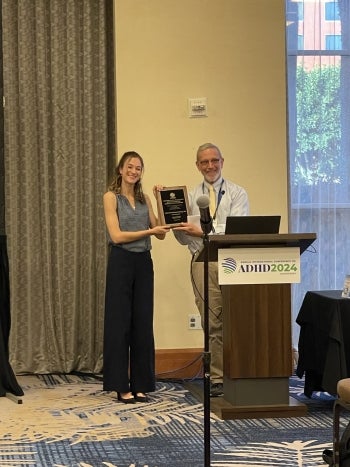ASU graduate student researching interplay between family dynamics, ADHD

Arizona State University psychology graduate student Gabrielle Fabrikant-Abzug is researching how parenting strategies can impact a child’s attention deficit hyperactivity disorder (ADHD) symptoms, especially when that parent has ADHD themselves. Image courtesy of Washington Post (https://www.washingtonpost.com/parenting/2022/08/01/adhd-parent-and-child/)
The symptoms of attention deficit hyperactivity disorder (ADHD) — which include daydreaming, making careless mistakes or taking risks, having a hard time resisting temptation, difficulty getting along with others and fidgeting — can cause challenges, both at home and at school, for the 7 million children who have been diagnosed with the disorder. ADHD has a strong genetic component and is highly heritable, and many children with ADHD have a parent who also has the disorder.
“When both parents and children exhibit ADHD symptoms, the outcomes tend to be worse; parents experience increased stress, and children can face more comorbid conditions,” said Gabrielle Fabrikant-Abzug, a graduate student in the Department of Psychology at Arizona State University.
Fabrikant-Abzug is working to understand how parenting strategies can impact a child’s ADHD symptoms, especially when that parent has ADHD themselves. She was recently recognized with the Young Scientist Research Award for research on understanding ADHD in the context of family dynamics by Children and Adults with ADHD (CHADD), an education, advocacy and support organization for people with ADHD. Fabrikant-Abzug presented her work at the Annual International Conference on ADHD, which took place Nov. 14–17.
“The ultimate goal of my research is to help families, and having my research recognized by an organization that I find so helpful and important is incredibly meaningful,” she said.
Medication and therapy are not the only ways to mitigate a child’s ADHD symptoms; interventions that improve parenting strategies also work — but less so when the parents themselves have ADHD. Fabrikant-Abzug is working with her mentor Lauren Friedman, an assistant professor of psychology at ASU, to untangle the interactions between parenting style and a child’s ADHD symptoms.
When both a parent and their child have ADHD, Fabrikant-Abzug explained that it can create a feedback loop.
“Children with ADHD often exhibit impulsive, hyperactive and inattentive behaviors that can evoke harsher parenting responses. These harsh parenting responses, in turn, exacerbate children’s symptoms and impairment,” she said.
Fabrikant-Abzug said that understanding this type of feedback loop could lead to therapies designed specifically for parents with ADHD.
“Parenting interventions could be tailored to increase parents’ awareness of their reactions, equip them with strategies to de-escalate challenging situations, and address parental ADHD symptoms,” she said.
Fabrikant-Abzug works in ASU’s Hyperactivity, Executive function, and Attention Treatment lab, which offers diagnostic assessment and treatment as part of the research it conducts.
More Science and technology

Applying AI to microelectronics manufacturing
Rivers flow across the planet’s surface, carving deep valleys and intricate canyons. Likewise, makers of microelectronics direct plasma, an ionized gas, to travel over silicon wafers, etching…

Applied Materials invests in ASU to advance technology for a brighter future
For nearly 60 years, global giant Applied Materials has been hard at work engineering technology that continues to change how microchips are made.Their products power everything from flat-panel…

Meet ASU engineering students who are improving health care, computing and more
Furthering knowledge of water resource management, increasing the efficiency of manufacturing point-of-care health diagnostic tools and exploring new uses for emerging computer memory are just some…


